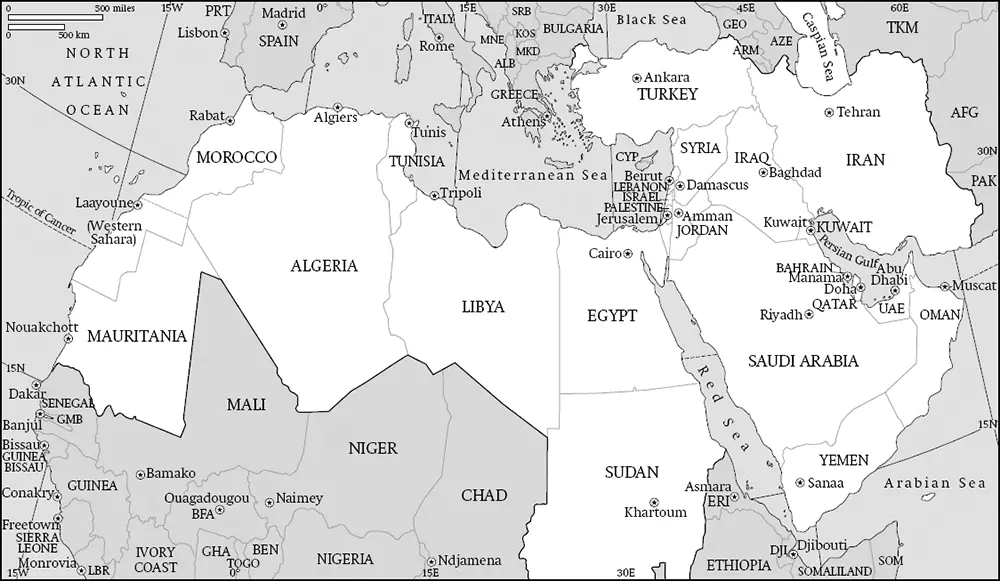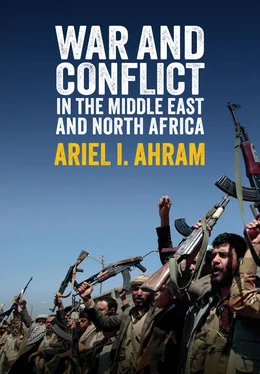First published in 2020 by Polity Press
Polity Press
65 Bridge Street
Cambridge CB2 1UR, UK
Polity Press
101 Station Landing
Suite 300
Medford, MA 02155, USA
All rights reserved. Except for the quotation of short passages for the purpose of criticism and review, no part of this publication may be reproduced, stored in a retrieval system or transmitted, in any form or by any means, electronic, mechanical, photocopying, recording or otherwise, without the prior permission of the publisher.
ISBN-13: 978-1-5095-3284-1
A catalogue record for this book is available from the British Library.
Library of Congress Cataloging-in-Publication Data
Names: Ahram, Ariel I. (Ariel Ira), 1979- author.
Title: War and conflict in the Middle East and North Africa / Ariel I Ahram.
Description: Cambridge, UK ; Medford, MA : Polity, 2020. | Includes bibliographical references and index. | Summary: “A conceptually and empirically rich introduction to war and conflict in the MENA”--Provided by publisher.
Identifiers: LCCN 2020002545 (print) | LCCN 2020002546 (ebook) | ISBN 9781509532810 (hardback) | ISBN 9781509532827 (paperback) | ISBN 9781509532841 (epub)
Subjects: LCSH: Petroleum--Political aspects--Middle East. | Petroleum--Political aspects--Africa, North. | Geopolitics--Middle East. | Geopolitics--Africa, North. | Civil war--Middle East. | Civil war--Africa, North. | Peace-building--Middle East. | Peace-building--Africa, North. | Middle East--History--20th century. | Middle East--History--21st century. | Africa, North--History--20th century. | Africa, North--History--21st century. | Middle East--Ethnic relations. | Africa, North--Ethnic relations.
Classification: LCC DS62.8 .A375 2020 (print) | LCC DS62.8 (ebook) | DDC 355/.033056--dc23
LC record available at https://lccn.loc.gov/2020002545LC ebook record available at https://lccn.loc.gov/2020002546
The publisher has used its best endeavours to ensure that the URLs for external websites referred to in this book are correct and active at the time of going to press. However, the publisher has no responsibility for the websites and can make no guarantee that a site will remain live or that the content is or will remain appropriate.
Every effort has been made to trace all copyright holders, but if any have been overlooked the publisher will be pleased to include any necessary credits in any subsequent reprint or edition.
For further information on Polity, visit our website: politybooks.com
AKPJustice and Development PartyAQIal-Qaeda in IraqCBLCentral Bank of LibyaFLNNational Liberation FrontFSAFree Syrian ArmyGNAGovernment of National AccordGNCGeneral National CouncilGTDGlobal Terrorism DatabaseHoRHouse of RepresentativesIBCIraqi Body CountICRCInternational Committee of the Red CrossIRGCIslamic Revolutionary Guard CorpsISIslamic StateJANJabhat al-NusraJCPOAJoint Comprehensive Plan of ActionKRGKurdistan Regional GovernmentLNALibyan National ArmyLNOCLibyan National Oil CompanyMENAMiddle East and North AfricaMNFMultinational Force in LebanonMSFDoctors without BordersNDCNational Dialog ConferenceNFZno-fly zoneOECDOrganization for Economic Cooperation and DevelopmentOPECOrganization of Petroleum Exporting CountriesP–Aprincipal–agentPAPalestinian AuthorityPKKKurdistan Workers’ PartyPLOPalestine Liberation OrganizationPMCsprivate military contractorsPYDDemocratic Union PartyPRIOPeace Research Institute OsloR2Presponsibility-to-protectRMArevolution in military affairsSANGSaudi Arabian National GuardSDFSyrian Democratic ForcesSNCSyrian National CouncilSTCSouthern Transitional CouncilTNCTransitional National CouncilUAEUnited Arab EmiratesUCDPUppsala Conflict Data ProgramUNEFUN Emergency ForceUNFILUN Interim Force in LebanonUNTSOUN Truce Supervision OrganizationVDCSViolations Documentation Center in Syria
There are, as always, too many people to thank. Louise Knight and Inès Boxman at Polity have been excellent stewards of the book since its inception. I benefited from the insights and critiques of my colleagues at the Virginia Tech School of Public and International Affairs, especially Joel Peters, Giselle Datz, Chad Levinson, Gerard Toal, and Mehrzad Boroujerdi. Bruce Pencek at the Virginia Tech library provided amazing support on issues of data collection and analysis. The Virginia Tech Statistical Application and Innovation Group helped with organizing quantitative data. I also received financial support from Virginia Tech’s Institute for Society, Culture, and the Environment. My work was inspired and informed by a number of inquisitive and tenacious graduate students, including Greg Kruczek, Gabi Mitchell, Nada al-Wadi, Jeanette Ruiz, Sezaneh Seymour, Joe Kushner, Joe Karle, Sayyed Ghanem, Mamoun Sulfab, and Pishtiwan Jalal. Crucial advice came from Boaz Atzili, Nadwa al-Dawsari, Stacey Philbrick Yadav, Mara Revkin, Nabil al-Tikriti, Raslan Ibrahim, Jonathan Wyrtzen, Lisa Anderson, Ellen Lust, Avishalom Rubin, Gabe Rubin, Jalel Harchaoui, Mohammad Tabaar, Marc Lynch, Kenneth Pollack, David Patel, Dan Byman, Steve Heydemann, Alexandra Stark, Daniel Neep, Sara Goodman, and Wendy Pearlman. Much of the writing of this book overlapped with my collaboration with Ranj Alaaldin on the Proxy Wars Project, funded by the Carnegie Corporation of New York. From halfway around the globe, Ranj was an important sounding board for many of the ideas developed in this volume. I am grateful to Hillary Wiesner at Carnegie for her confidence and support. Rachel Templer assisted with editing. Hers were often the first pair of eyes to read the manuscript. I would never have begun – much less finished – this book if not for my fortuitous friendship with Paul D. Williams and our grim mutual interests.
Finally, I thank my family for their love and care. My mother, Judi, was a constant source of support. My wife, Marni, and daughters, Matilda and Leonie, all played a role they will never know. I hope, as always, that this book contributes to a good they can inherit.

Iraq. Palestine. Libya. Yemen. Syria. Today these words denote not just countries, but also brutal, interminable, or recurrent wars. News reports of massacres, bombings, assassinations, and airstrikes in the Middle East and North Africa (MENA) have become so frequent that some are desensitized to the bloodshed. But this violence is not far away. Weapons and troops dispatched from the West are deeply involved in the fighting. At the same time, the threat of foreign terrorism unleashed in cities like New York, London, Brussels, Paris, or elsewhere has become a major security concern.
Beyond the moral and political problems, war and violence in MENA pose an analytic puzzle. Scholars of international relations have described a general decline in war and lethal violence, although the causes and even moment of the beginning of the decline remain in some dispute. 1MENA stands out as the anomalous outlier. The researchers at the Stockholm International Peace Research Institute diagnose MENA as suffering “chronic insecurity and persistent susceptibility to armed conflict” at the heart of contemporary global security concerns. 2A former senior US official finds MENA “more combustible than ever.” 3
This exception has elicited a number of exceptional explanations. Some focus on geopolitics and the destabilizing impact of outside powers. This approach, typically anchored in realist theories of international relations, argues that the balances of power and threat amongst countries is the primary determinant of war. Outside interventions create regional instability and precipitate conflict. This approach has proven useful in explaining the region’s interstate rivalries and conflicts, including the Arab–Israeli wars. Yet geopolitical explanations tend to falter when it comes to the region’s myriad internal wars. They are also mute as to the larger questions of war’s social ramifications and the ability of regional actors to make their own political and military designs.
Читать дальше













